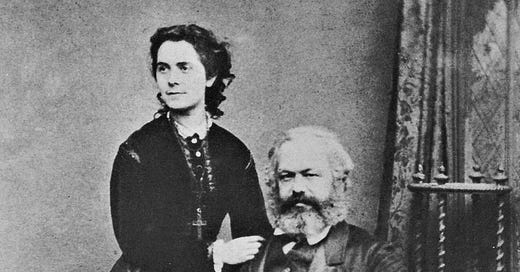Karl Marx’s Father Warned the World—And He Was Right
Heinrich Marx feared his son’s tormented soul would doom him to a life of unhappiness—and bring misery to those around him.
On March 2, 1837, Heinrich Marx wrote a letter to his 18-year-old son, Karl.
In the letter, Heinrich expressed concern about what “animated and governed” his son’s heart.
“At times my heart delights in thinking of you and your future. And yet at times I cannot rid myself of ideas which arouse in me sad forebodings and fear when I am struck as if by lightning by the thought: is your heart in accord with your head, your talents? Has it room for the earthly but gentler sentiments which in this vale of sorrow are so essentially consoling for a man of feeling? And since that heart is obviously animated and governed by a demon not granted to all men, is that demon heavenly or Faustian? Will you ever -- and that is not the least painful doubt of my heart -- will you ever be capable of truly human, domestic happiness?
The first thing that caught my attention about the passage was Heinrich’s fear that “a demon” had captured his son’s heart. It’s impossible to tell if Heinrich is speaking literally or figuratively here, but we do know that Heinrich Marx was a Protestant Christian unlike his son, who embraced atheism as a young man and despised religion.
We also know that Heinrich Marx was not the only person to fear that “a devil” of some kind had seized Karl’s soul. Others in Karl Marx’s circle used similar phrases to describe the spiritual state of the co-author of The Communist Manifesto.
But what really captured my attention was Heinrich Marx’s final question to his son:
“Will -- and this doubt has no less tortured me recently since I have come to love a certain person like my own child -- will you ever be capable of imparting happiness to those immediately around you?”
The “certain person” Heinrich was referring to was Jenny von Westphalen, whom Marx would marry in June of 1843 after a seven-year engagement.
Heinrich Marx was beginning to love Jenny just like one of his own children, and he sensed “a fear laden with foreboding” in her toward the younger Marx, despite her affection for and devotion to him.
“…I note a striking phenomenon in Jenny. She, who is so wholly devoted to you with her childlike, pure disposition, betrays at times, involuntarily and against her will, a kind of fear, a fear laden with foreboding, which does not escape me, which I do not know how to explain, and all trace of which she tried to erase from my heart, as soon as I pointed it out to her. What does that mean, what can it be? I cannot explain it to myself, but unfortunately my experience does not allow me to be easily led astray.”
What Heinrich Marx and Jenny both seemed to sense was that Karl would never find “domestic happiness” and that he would make everyone around him miserable, especially his family.
In other words, the philosophy that was brewing in Marx wouldn’t just destroy hundreds of millions of lives once it was given new life by Lenin and others. It would destroy Marx, Jenny, and their children.
It’s worth pointing out that Marx hated the institution of the family so much he wanted to abolish it. Perhaps it’s no surprise, then, that Marx found such little happiness in marriage himself.
“Blessed is he who has no family,” Marx wrote in a letter to Engels.
Marx’s contempt of the family came at great cost. Instead of dedicating himself to his wife and children, Marx poured his soul into Marxism, a philosophy constructed on envy, materialism, and class antagonism. The result was a life of misery and poverty.
Karl and Jenny Marx spent most of their lives broke. This compelled them to beg for money from family members (and of course Engels). When one family member would cut them off, they’d move on to someone else (and show no gratitude for those who had helped them).
As Marx wrote his ideological screeds, his son Edgar died at age eight of malnutrition. Three others children failed to reach the age of one. Two of Marx’s children that did live to adulthood—Eleanor and Laura Marx—committed suicide.
Jenny, meanwhile, was constantly miserable, something Karl Marx was painfully aware of.
“Every day my wife says she wishes she and the children were safely in their graves, and I really cannot blame her,” Marx wrote Engels, “for the humiliations, torments, and alarums that one has to go through in such a situation are indeed indescribable.”
We’ll never know what “demon” possessed Karl Marx. But Heinrich Marx sensed in his son some kind of evil that would make not just Marx miserable, but everyone around him.
Socialism, it seems, is just as corrosive to the individual as the collective.
(P.S. I discovered this anecdote in historian Paul Kengor’s book The Devil and Karl Marx. The book is hard to put down and well worth the read for anyone looking to learn more about Marx.)






Thank you for this article - very interesting.
Utterly fascinating! I had no idea how much his family suffered because of his beliefs.